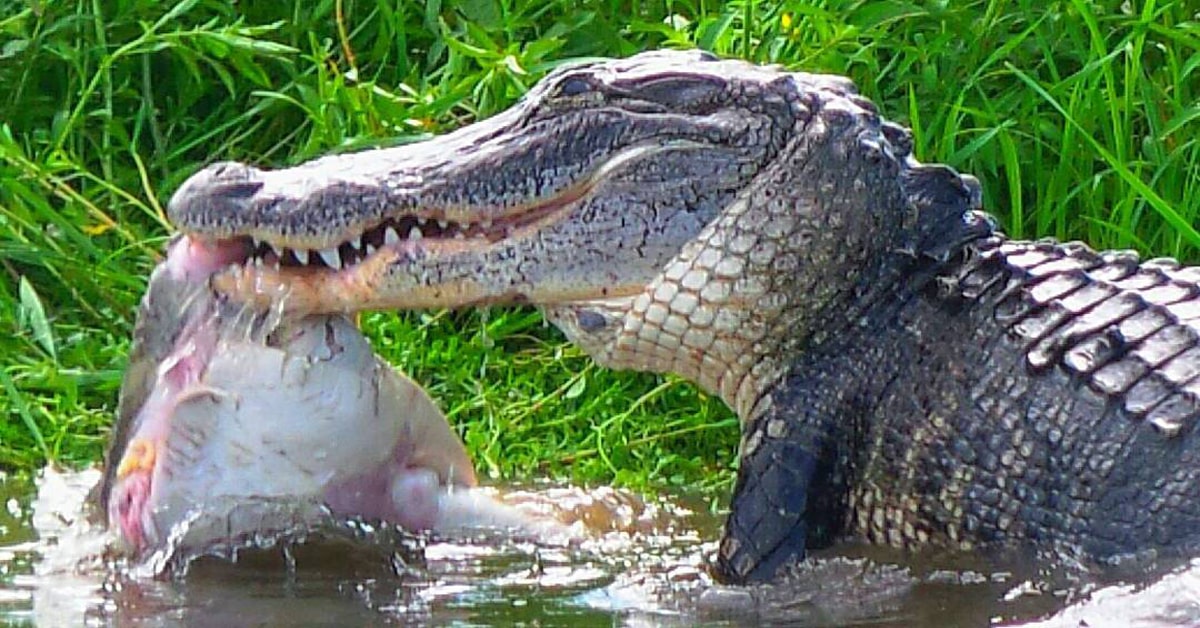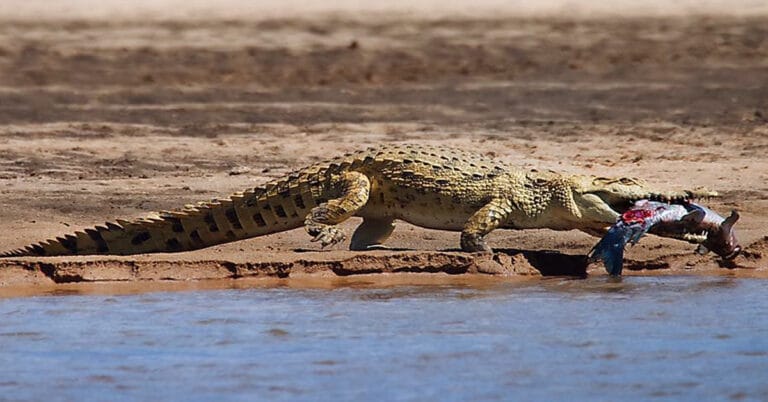What Do Alligators Eat?
Alligators are famous for their large jaws and sharp teeth. They are large reptiles and belong to the family of Alligatoridae. There are currently two extant species, including the Chinese alligator and the American alligator. According to the research, they first appeared around 37 million years ago.
Well, even with one look at their huge appearance, many people wonder what do alligators eat. Therefore, in this article, we will discuss the eating habits of alligators; what they eat; and how much they eat. Therefore, to find out more, let’s explore this amazing creature.
Biology Of Alligators
To learn more about what do alligators eat, let’s first explore their biological characteristics. American alligators can grow as large in weight as 360 kilograms and as long as 4 meters in size. The largest alligator was found in Louisiana, where it was 5.8 meters long.
In comparison to American alligators, Chinese alligators are smaller in size and can grow as long as 2.1 meters. Not only are they shorter in length, but they also weigh approximately 45 kilograms.
Alligators are usually black, but they can also be olive-brown with a white underbelly. The young alligators have yellow or white stripes, and with their dark skin, they are really contrasty. Their colors and visual sides help those reptiles hide in reeds and wetland grass, which works as camouflage.
American alligators may be found in both freshwater and brackish water habitats such as ponds, marshes, rivers, wetlands, swamps, and lakes. Alligators create holes in the wetland, and these holes are later used as a shelter for many animals and also play a vital role in plant diversity.
What Do Alligators Eat?
Although alligators are mostly meat eaters, they occasionally consume certain forms of plant materials to supplement their diet. In addition to their size and age, what they consume also depends on their location and living environment.
So, what do alligators normally eat? Some of the foods that they often feed on are:
- Mammals
- Fish
- Birds
- Fruit
- Reptiles
- Amphibians
- Insects
- Worms
- Spiders
- Snails
- Other alligators
Young alligators often enjoy eating smaller prey such as snails, worms, insects, spiders, etc. Those require less energy and power to hunt, chew and swallow. Therefore, they are simpler prey for baby alligators. Additionally, smaller alligators also enjoy eating birds and fledglings of various species.
Because of the fact that alligators frequently reside close to bodies of water, fish make up a significant portion of what do alligators eat. Alligators will consume any fish, regardless of its species or size, that they can locate in a given area. In addition to fish, alligator habitats are rich in reptiles and amphibians. Alligators will consume whatever reptiles and amphibians they can find, including frogs, snakes, salamanders, turtles, and snakes.
From small animals like raccoons and muskrats to big animals like bears and panthers, alligators devour a diverse range of mammals. If given the chance, alligators will occasionally consume pets like cats and dogs; thus, if you reside in an area where alligators are present, you shouldn’t let your animals out unsupervised. Alligators seldom cannibalize one another, although, under severe food shortages, adults may consume the young and weaker alligators.
If an alligator feels hungry and there is no available food nearby, then those creatures have no problem eating the fruits. Oranges and wild grapes are two examples of what do alligators eat. Alligators will occasionally consume fruits if they are growing nearby.
Given that alligators consume a wide variety of foods depending on what is available, it is difficult to choose one as their favorite. They are not fussy at all since they are opportunistic eaters. However, generally, they pursue much larger animals. Those reptiles generally seem to favor prey that is smaller than themselves. Due to their lack of natural predators and history of hunting bears and panthers, alligators are in the first position in the food chain and are referred to as apex predators.
Eating Habits Of Alligators
What do alligators eat is greatly determined by their eating habits. Alligators have a very slow metabolism and a high body weight. However, they can make very sudden and quick movements. Smaller creatures that alligators can kill and consume in a single bite make up the majority of their diet. Larger prey may be killed by being grabbed and dragged into the water to drown.
Alligators devour non-bite-sized food by letting it rot or by biting and then doing a “death roll,” in which they spin or convulse frantically until bite-sized pieces of food are ripped off. The tail must bend at a specific angle in relation to the body for the alligator to begin a death roll. If the tail is not mobilized all the way, an alligator cannot do the death roll.
The majority of the jaw’s muscles have developed to bite and grasp prey. The muscles that are used to open the jaws are very strong compared to the muscles used to close them. Because of this, a human can keep an alligator’s jaws closed without using just their hands, and it does not require additional power. Numerous wraps of duct tape are sometimes used in order to keep an adult alligator from opening its jaws while being handled or transported.
What Eats Alligator?
We discussed what do alligators eat. However, it is also interesting to know what eats alligators. Well, the alligator’s life cycle stage affects alligator predators too. Alligator eggs, hatchlings, and young are among the smallest creatures that are often victims of large-sized animals. Alligators face few natural threats as adults since they are at the top of the food chain and have no or very few natural predators.
Humans are considered to be one of the main threats to alligators. They hunt for meat, food, skin, and teeth. Alligators are an important component of the food chain for animals. These species control the population of many creatures because they are the main predators in their ecology.
Once an alligator has captured its victim, there is little hope for escape. An alligator’s strong bite may fracture the shell of a turtle or the bones of a medium-sized animal. The truth is that the alligator that weighs 200 kilograms and is 3.6 meters long can bite with the power of 2.209 pounds.
How Often Do Alligators Eat?
Not only is it interesting to know what do alligators eat, but people also wonder how often they eat. Alligators feed less often than warm-blooded animals because they have a slower metabolic rate.
They have the ability to conserve energy because those reptiles do not have to move around that much, and all they have to do is stay in the water. A full-grown alligator may go for a week after eating small animals such as raccoons. Alligators may eat more regularly or less frequently depending on the season.
When it becomes cold outside, their metabolism slows down and they start to brumate. During the winter, alligators enter a state of brumation, which is prolonged sleep. In comparison to the summer, alligators don’t consume as much in the winter months. Alligators do not refuse to eat if they have an opportunity to in most cases. Therefore, they can eat as often as they need.
The smaller alligators that are still young typically eat small portions of meals every day or every few days. Similarly, older ones also eat when they have a chance and like to eat smaller meals every day. However, if they have recently eaten large prey, they prefer to consume smaller portions in the next few days.
Are Alligators A Threat To Humans?
Cases of alligators attacking humans are uncommon but not unheard of. When an alligator is famished or unable to obtain its usual food sources, it can become extremely threatening, and if it comes across a human, this reptile will eventually use its chance. Alligators may become agitated if people approach them or their nests, which might lead to an attack.
Although humans are not an alligator’s natural prey and alligators typically avoid attacking people, if, given the chance and the motivation, alligators will consume almost anything. When spotting an alligator, as long as you stay your distance and avoid making any abrupt movements, you should be fine.
Alligators lose their inherent fear of people when they are fed, though. Therefore, they may begin attacking people once they begin to link them with food. Because of this, in many locations where alligators are found, it is prohibited to feed them.
Bottom Line – What Do Alligators Eat?
After discussing the eating habits, it is clear what do alligators eat. Generally, they are opportunistic predators, meaning that those reptiles will eat anything that becomes available to them. Alligators are mainly carnivores. However, they also eat plants such as fruit and berries when they have to and also in order to balance their diet.
Even though the alligators prefer to eat often, they can go without food for up to a week without a problem. Alligators’ eating habits change in the winter months. This is generally because of the brumation period that alligators have in colder weather.

Nato is a content writer and researcher with a background in psychology who’s eager to explore the wonders of nature. As a travel enthusiast and animal lover, she hopes to inspire others to discover and cherish the beauty and importance of the natural world.


